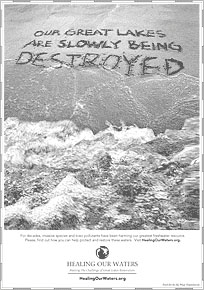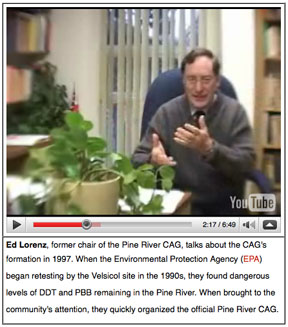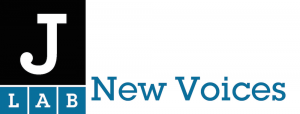Statistics
Between August, 2007 and June 6, 2008, GreatLakesWiki.org had:
- 31,122 unique visitors
- 36,622 visits
- 103,963 page views
- 1,500 registered users
- 140 unique visitors per day
- 2.84 average pages per visit
- Average time on the site: 1:57 minutes
There is a fishing derby in Michigan’s central Lower Peninsula unlike any other. Competitors can’t eat what they catch — it’s too contaminated. A freezer stands ready for fish with tumors. That way they can be sent to state regulators for analysis.
Such contest rules are among the ways Great Lakes Wiki reporters found how life in St. Louis, Mich. continues to be shaped by the presence of one of the nation’s earliest Superfund sites. It is here where a former Velsicol Chemical Co. factory spilled tons of the pesticide DDT into mid-Michigan’s Pine River. It is here, too, that the fire retardant PBB was inadvertently mixed with cattle feed, an event that brought international attention because it contaminated the state’s food supply.
More than 30 years later, St. Louis remains polluted. But the international attention is gone. The community remains outside of the state’s major media markets. Residents’ struggle with their toxic legacy goes largely unnoticed. But in late 2007 the Great Lakes Wiki brought renewed and unique attention to the Pine River and St. Louis.
Students with Michigan State University’s Knight Center for Environmental Journalism first met with a local citizens group that advises the U.S. Environmental Protection Agency on the ongoing cleanup. Over a period of weeks, they interviewed them and began to tell their story with text, images, Google maps and video clips.
Thee resulting multimedia effort was supported with links to documents found elsewhere on the Web. This is a growing, living news story with the ability to change as circumstances warrant. While the students’ work is over, they’ve left behind something yet to be shaped by others with the new tools of collaborative journalism.

A print advertisement from the Healing Our Waters campaign
This pioneering effort was recognized in 2008 by the Society of Professional Journalists as one of the nation’s top three online in-depth news stories reported by university students. The Great Lakes Wiki is an exciting platform for teaching, researching and committing citizen journalism. We continue to be impressed by the long term utility of its reports.
Last November, Great Lakes Wiki reporters covered a conference on how to communicate issues surrounding highly contaminated regions identified by the U.S. and Canadian governments. Lawmakers, scientists, regulators and journalists discussed communication techniques. About 60 citizens attended. The Great Lakes Wiki report remains archived online with video clips of speakers so that citizens from across the Great Lakes basin can continue to benefit from this workshop. The Knight Center has incorporated clips from the same report into an online environmental reporting class.
But this final report is not just about celebrating successes. It should also be a level-headed look at barriers and hurdles for engaging the public in citizen journalism. And while in some ways the Great Lakes Wiki is successful, in other ways it has yet to succeed.
The Pine River project is also illustrative of this point.

A video created by Great Lakes Wiki about the Citizen’s Advisory Group for Pine River
We are excited about bringing unusual attention to a forgotten story, but we are disappointed not to have engaged local citizens to a greater extent. We met with them before the project precisely to gain early buy-in and generate enthusiasm that might continue with their own contributions. They were enthused, receptive and encouraging of the students. But they have not taken ownership of the project. And while the Pine River report remains an important element of the Great Lakes Wiki, it has not changed since the students produced it.
This experience is perhaps illustrative of the Great Lakes Wiki as a whole. Occasionally groups carve a corner of the Wiki out for themselves…. [But] there are far too few non-MSU contributors for our satisfaction. Original reports on the Great Lakes Wiki continue to be primarily produced by our students. It’s wonderful experience for them, but we want to see much more participation from the broader community.
Two possible reasons:
- As simple as the wiki is to operate, it is still a much steeper learning curve than a blog. There may be a technical hurdle here.
- The Great Lakes community has many, many organizations (and websites) looking at environmental issues. It may be that it’s all anyone can do to keep up their own websites. Our hope was to reach those who did not have a direct web outlet for this kind of news and information.
A significant accomplishment this year is the integration of Google maps into the site.
Locative information is critical for environmental stories. We foresee a project that could map the locations of every federal or state listed site in the region. Clicking on the location would bring you to a wiki entry about the site and could become the initial impetus for locals to begin reporting on those sites themselves.
We are examining ways to integrate another Knight Center project into the Great Lakes Wiki. Great Lakes Echo is a popular news digest of mainstream media reports. We gather this information ourselves, but we hope that we can now interest citizens in providing the stories and the links and to comment on the stories. This could greatly boost the interactivity of the Wiki.
It could work two ways: Wiki stories could be augmented by RSS feeds of appropriate news story categories. And the Echo daily news digest could include links to stories generated by Wiki reporters.
At the same time, we’re exploring whether we can migrate the Wiki to an easier to use platform, one that is more intuitive and less intimidating. This effort could entail a significant redesign and we hope to pool remaining J-Lab funding with other funds to pull it off.
In addition, we envision capturing information on campaign finances and voting history on issues and politicians relevant to the environment.
We have a potential and significant partner with a project run by the Great Lakes Commission, a compact of the eight Great Lakes states that operates the Great Lakes Information Network. Some thing to consider: This is a government entity. Does that help of hinder the citizen aspect of what we’re trying to promote?
We continue to view the Great Lakes Wiki as a fantastic experimental platform for multi-media and citizen reporting on the environment. Our students will be among those trying to figure out the next generation of environmental reporting. The Great Lakes Wiki gives them a wonderful proving ground and research area.



